|
Welcome to A&A. There are 24 full reviews in this issue. Click on an artist to jump to the review, or simply scroll through the list. If you want information on any particular release, check out the Label info page. All reviews are written by Jon Worley unless otherwise noted. If you have any problems, criticisms or suggestions, drop me a line.
|
|
|
A&A #230 reviews (June 2002) Old Friends (short reviews of previously-reviewed artists):
 Alcian Blue
Alcian BlueSlow Colorless Stare (self-released) The stare part of the title is pretty accurate. Alcian Blue filters current trends in noise pop through the mechanical psychedelia that marked the end of My Bloody Valentine. Think Seam with lots and lots of distortion (and the like). The songs are pretty. I swear. It's just that sometimes you can't quite make out the beauty for all the mud on top. That's not a problem for me; I've come around to liking this sort of messy music. In fact, I rather like stripping away the layers to hear what lies beneath. While few bands utilize this much reverb and distortion and such, this sort of studio manipulation does seem to be making a comeback. Alcian Blue has a lead on most of its competitors, though, as its songs would sound great straight. The playing is exemplary, and all the effects merely enhance the themes evoked by the band. The sorta disc that takes a while to warm to, I guess, but that's awfully rewarding when you finally break through. The pop apocalypse may be approaching once again (I think that's an oxymoron; whatever), and I can't think of a better band to be the standard bearer.
������������������������������������� 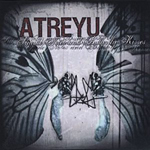 Atreyu
AtreyuSuicide Notes and Butterfly Kisses (Victory) Imagine, if you will, early My Dying Bride, minus the violin. The anthemic goth overtones are present, but the aggression level is still high. Now take those long songs and chop them into three-minute bits. Add in a dose of melodic choruses, and you might be close to Atreyu. There are hints of all sorts of influences past MDB. As with almost any loud band these days, there is a debt to Fear Factory (the upper-register "sung" vocals are the most obvious element). The melodic lines of the guitar breaks (though not the main riffs) are straight out of Iron Maiden. Atreyu also harkens back to classic hardcore with its song structure and, occasionally, chord progressions. Most of the songs, though, are blistering goth hardcore. The guitars have those nice, dulled edges--no metallic sheen. I think what really makes all of this work so well is the simple song construction. Short, loud, fast. A formula that will make even average stuff sound pretty good. When the material is as solid as Atreyu's, well, the results are spectacular. Turn it up and let the adrenaline overtake you. Amalgams like this can often sound forced or incomplete. Atreyu has distilled its sound into a pure essence. There is power here.
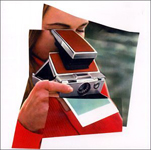 Hudson Bell
Hudson BellCaptain of the Old Girls (Upperworks) One of the mysteries of Half Japanese is how Jad Fair managed to make such great pop music without much instrumental talent and no vocal skills to speak of. Hudson Bell isn't the world's greatest singer (his style reminds me a lot of Fair's, to be honest), but he sure does have a way with his music. The songs also follow the kinda bludgeon-style anthems that typify my favorite HJ stuff. These aren't plodding works, but swooping, majestic delicate sledgehammers that keep falling until the point is driven home once and for all. Bell's voice also reminds me, at times, of Jay Farrar. And the sophisticated collage style of song construction here is reminiscent of Sebastopol. Not a bad thing at all. Mostly, though, Bell manages to be himself, no matter who he's reminding me of from moment to moment. I'm a sucker for quavering vocals, and I'm equally enamored of grandiose layered pop music. Plenty of both here to satisfy.
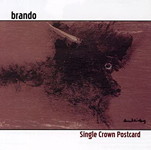 Brando
BrandoSingle Crown Postcard (Recordhead/Mr Whiggs-Luna Music) Brando has always had the potential to test the limits of pop excess. Derek Richey's songs are winding and idiosyncratic, lending themselves to washes of distorted synth strings and other elaborate touches. On this album, that potential is realized. It only took 15 years or so for the Flaming Lips to make the world safe for such sounds once more, but we should all stop for a moment and thank Wayne and the boys once again. Certainly Brando owes a debt there. But these songs are much more Oh My Gawd! than The Soft Bulletin. Sometimes lurching, sometimes bounding and sometimes simply sitting on top of a cloud, the pieces here ring out with a fractured clarity. The excess is simply window dressing. It helps to show off the songwriting a bit. But only a bit. Richey's straightforward style translates well to this sound. I'm glad he's taken Brando further down this path. Maybe next time he'll dive in headfirst and surface only at the end. That would really be something.
������������������������������������� 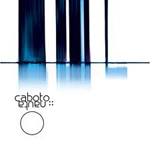 Caboto
CabotoNauta (Scenester) Caboto is four guys from Italy who have decided to take noise pop to its logical jazz fusion extreme. Indeed, these songs are almost completely jazz in construction and playing style, though the band itself is a standard rock combo in composition. Not entirely unlike that Iceburn tried to do before it obliterated itself, I guess, though Caboto does well without using too many "jazz" instruments (there is some trumpet on one piece, and an accordion does wander around a bit--though you'd hardly call an accordion a "jazz" instrument). The result is a sound that feels familiar without actually being so. Fans of Tortoise, the Sea and Cake or High Llamas will appreciate some of the "high pop" moments, while June of 44 fans will probably appreciate the sometimes manic interplay between the guitar, keyboards, bass and drums. And, yes, jazz fusion and prog fans will find some bits they like as well. Of course, by mixing all of these sounds so stylishly, Caboto may well alienate fans at the same time. That's the risk of going out on a limb and crafting a clever take on an innovative sound. Me, I'm just surfing the multitudes of lines. Great stuff.
 Caesura
CaesuraMore Specific Less Pacific (54-40 or Fight!) Speaking of points along the noise pop fusion continuum, here's Caesura. Sounding much like early June of 44, what with some wonderfully squalling guitars and blistering rhythm work, this trio hacks away incessantly. Sometimes they really connect. Actually, most of the songs here are tight, focused and brilliant. Unlike most bands who ply these waters, Caesura specializes in short bursts of energy, songs that would seem to be fragmentary except for the depth of ideas within them. The sound is raw, almost to the point of bleeding. The only things that keep these pieces from cutting their way through the plastic on the CD are the simple (and vaguely rounded) sounds of the guitar and bass. Almost no effects--most of the time--which keeps the overall feel just this side of utterly abrasive. Which isn't to say these pieces are pleasant. There are plenty of lines for the intellectual listener to follow, but Caesura specializes in emotional and physical response. This music gets the blood flowing, cranking the heart more and more until it seems it just might not be able to handle the strain. Then the album is done. Finally comes the junkie's dilemma: Risk physical depletion or ignore the jones. Me? I hit repeat.
 Capitol K
Capitol KIsland Row (XL-Beggars Banquet) Yet another of the Beggars Banquet UK special imports, Capitol K plies its pop seas with a collage rudder. These songs are meticulously assembled piece by piece, and yet the final sound is anything but mechanical. Rather, there are joyous grooves in these bouncy songs. No, the band (well, Kristian Craig Robinson, who is Capitol K) is careful to make sure that the songs come together, no matter how goofy or warped the elements may be. And trust me, there are plenty of strange moments. Robinson is a fan of minor keys and blue notes, and he uses his samples and loops to further those interests. There's a wide range of emotion within this album, and Robinson is a master of controlling the mood. Now, it's impossible to get past the fact that this is an album of craft. Robinson doesn't hide his seams, but rather revels in them. He uses dissonance and uneven segues to complete his thoughts. Not the easiest thing to do, but a task that seems to have been achieved effortlessly. A most impressive set.
 Tom Clark and the High Action Boys
Tom Clark and the High Action BoysCross-Eyed and Bow-Legged (Blacksmith) Somewhere between roots rock, alt. country, rockabilly and, um, just plain ol' rock and roll, Tom Clark and the High Action Boys ride the range. Clark plays guitar, and the better songs here are the ones that feature his picking. Somehow, he seems to sing better when his hands are occupied. I know, he probably recorded the guitars and vocals separately, but what the hell. That's how it sounds from here. Clark has a fine sense of songcraft, and he uses it to spin tales in all sorts of different (but related) sounds. That wandering ear gets Clark in trouble from time to time. He's got the chops to make the songs solid, but some of his pieces (particularly the ballads, for some reason) don't quite have the style and confident feel of the best on this album. Nonetheless, I must admit that I'm quibbling here. There isn't a bad song of the 14 on this disc, just an ordinary one here and there. If Clark would focus on just a few sounds (perhaps the old-fashioned country and rockabilly--invariably his best here), he'd probably impress me just a smidge more. As it is, I simply like what I hear. And that's not bad.
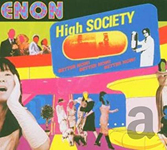 Enon
EnonHigh Society (Touch and Go) The second effort from John Schmersal's post-Brainiac band. And, yes, Schmersal's trademark bruising guitar is featured on many songs. But what may surprise those who didn't catch Enon's first album (or later Brainiac, for that matter) is how subtle that guitar can be at times. The songs here range from rumbling bashers to near-electropop. The versatility of the band is impressive, though hardly surprising. Each song creates its own reality, its own version of Enon. Put them all together, and you might question how they fit at all. But, really, there is a core sound here. It revolves around Toko Yasuda's (generally) fuzzy bass and the percussion (man or machine). These are pop songs, and while Enon does travel to the edges of the sound, it pushes the limits without tearing through them. Which leaves this shimmering, throbbing album most accessible to even the casual consumer. Those who followed the arc of Brainiac wouldn't be surprised by the deft scene changing on this album. Top-notch technicians, Enon cruises the grooves masterfully. Intense fun for the discriminating popster.
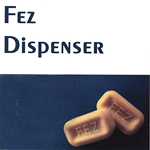 Fez Dispenser
Fez DispenserFez Dispenser (Skin and Barrel) Those of you looking for electronic beat work inside a jazz idiom need search no more. Fez Dispenser blows out its grooves in a full-on fusion attack, waxing smooth and blistering as necessary. That's smooth in the delivery, not "smooth jazz." These guys turn out one impressive piece after another, never falling into a repetitive rut. Full marks for originality. Just enough of a hip-hop edge to the beats to keep the joints jumpin'. Fez Dispenser uses everything at its disposal (samples, drum machines, guitars and more) to create complete aural snapshots. The texture within these songs is amazing. A fine disc for your next party. Cool enough that it won't scare off the less adventurous in your crowd, but stylish enough to impress even the most imperious music snob (like, say, me). Quality and then some.
������������������������������ Flying Nuns Everything's Impossible These Days (Q Division) Back in the olden days (when I was but an impressionable youth), there was this thing that didn't have a name. It wasn't "alternative," and neither was it "indie rock," though that seems to be what people call it these days. Whatever it was, the stuff generally featured vaguely disjointed songs full of ragged hooks and lots of volume or disortion or at least some fast drumming. We're talking about a very vague thing here. Anyway, Flying Nuns fall right in there somewheres. I think what I hear here that really makes me identify with that old school stuff is the stream of consciousness style these boys play. The music, I mean. The lyrics are fairly convoluted, of course, but the music seems to follow its own internal rules. This stuff shouldn't work. But it does. Gloriously. And so I'll just sit back and bask in the wonder of it all. The ideas just swirl about my head, distracting my mind from the obvious flaws in construction. See, when stuff works, it works. Rules don't matter. Flying Nuns know how to make good music. And that's all you need to know.
Mark Gallo & the Witness Mark Gallo & the Witness EP (self-released) I was listening to the Chills the other day. I don't do that a lot, but every time I do I kinda think to myself, "Why don't you do this more often?" Mark Gallo & the Witness does the same thing to me. Anthemic pop driven by acoustic guitar (more like the Church than Robyn Hitchcock, if you're following my references). The choruses soar, the melodies flow and the mood is never broken. Only three songs here, but man are they good. Gallo and company sure know how to write this kind of song. There's not a lot of variation, but boy, this sure hits the spot. Scratched my itch, to be sure.
������������������������������������� 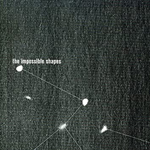 Impossible Shapes
Impossible ShapesLaughter Fills Our Hollow Dome (Recordhead/Mr. Whiggs-Luna Music) In structure, the Impossible Shapes play the same sort of anthemic pop music as labelmates Brando. But instead of using layer after layer of sound, these guys embrace a decidedly minimalist approach. Same kinda songs with a completely different effect. And not a bad one, either. As is always the case with pop music, the writing is key. The underlying idea must be simple and direct, no matter how loopy the window dressing can become. And there are a few trinkets along side of the road. It's just that their use is restrained. The sound is rich and textured; it's simply understated and easygoing. All the better to enjoy the songs themselves. Which is about as easy as anything can be. The Impossible Shapes have created a fine set of rollicking--yet mellow--tunes that immediately take a hold of the brain. Impossible to shake.
�������������������������������������  John Rifle
John RifleFracas Nurture (self-released) Most of the lyrical content is comprised of samples and found sound. The music varies widely but generally isn't much more than accompaniment for the assembled sounds. There are a few easy jokes, but most of the stuff here is better-described as acid-laced cultural commentary. Obscenity-laden, replete with self-references, this album burns a swath of destruction through today's society. But is it good? I don't know. This album is arresting and often mesmerizing. Sometimes I do wish the comment had a bit more of a satiric or ironic quality to it. General meanness is all fine and good, but it oughta lead somewhere. That would be my only hangup here, I guess. But a lack of overall cohesion isn't enough to make me slag John Rifle too much. There are too many dead-on observations to dismiss this as mere scattershot attack. Pretty damned cool.
������������������������������ 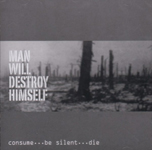 Man Will Destroy Himself
Man Will Destroy Himselfconsume...be silent...die EP (self-released) There are those who forget that my little corner of the New South has something of a reputation for metallic hardcore. C.O.C. hails from these here parts, and there's plenty more where that came from. Take Man Will Destroy Himself. The stuff can only be described as melodic extreme hardcore. Fast, brutal and yet somehow tuneful at the same time. Way too tasty for its own good. This is the kinda fare that could really go over to a mass audience. A frightening thought, really. Not that millions of kids would buy this, but that if you push a sound to the edge you end up coming back to the middle. Politics is the same way, of course. But this review has nothing to do with politics, just kick ass music. MWDH has plenty of that.
������������������������������ �������������������������������������  No Use for a Name
No Use for a NameHard Rock Bottom (Fat Wreck Chords) Not many punk bands would open an album with a slow, lumbering, almost nostalgic song. Pretty straight, too. I didn't detect a lot of irony. Then, of course, the usual speedy-yet-tuneful songs commence. More Betterness was one of the great pop punk albums of the past few years. Right up there with Don't Back Down and any number of NOFX efforts. Any follow up almost has to sound a little hollow and somewhat wanting, if only because I haven't listened to it 2000 times. But Hard Rock Bottom fares better than I figured it would. The songwriting is still sharp and the sense of humor still biting. Just about everything I could hope for, to be perfectly honest. Another big wad of fun, truly. The Shinehead O'Connor cover is about what you'd expect (not as scintillating as "New York Fairytale," but then, that Pogues tune was already a classic), and in general the songs live up to the high standards of the band. Good, verging on great.
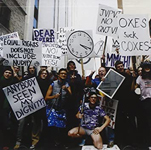 Oxes
OxesOXXXES (Monitor) The mock protest on the front and back cover contains a few funny signs. My personal favorite reads "Sarcasm does not equal irony." Damn straight. If Hollywood would figure that out, maybe we'd get some decent movies once in a while. Enough soapboxing. Time to get into the Oxes. These boys first wowed me years ago with a split release they did with Big'n. This album does nothing to remove the notion in my mind that the guys are true masters of the no wave sound. But this is no randomly chaotic bruising. Hardly. There's more than a little of the noise pop fusion sound in there as well. And that's fine. Some solid underpinnings to the songs does the stuff good. Just means that when the playing gets frenzied (be it loud or merely technically astonishing) there's always something in the center. Some folks have this notion that rock instrumentals are dull, repetitive and uninteresting. Obviously, this isn't a problem of mine. But methinks Oxes might turn more than a few folks around on the issue. This album simply smokes. Nothing left to say.
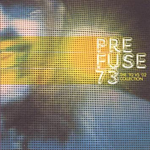 PreFuse 73
PreFuse 73The '92 vs '02 Collection EP (Warp) PreFuse 73 takes his name from his interest in jazz circa 1973 before fusion took hold. This short set finds our hero crafting crazy beats (as per usual) and arranging them in pretty pictures. Soulful, really, despite the preponderance of electronic sounds. Indeed, if some of today's urban stars are truly wondering how they can stay modern without sacrificing the emotional impact of the old school, this disc is a fine primer. It's all about attention to detail. PreFuse 73 takes care to massage all of the little pieces, and so his final compositions shine with an inviting glow. More ear candy from a master mixer.
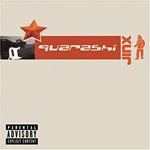 Quarashi
QuarashiJinx (Time Bomb/Columbia) Metallic yet soulful industrial-driven hip hop. An easy reference is Rage meets the Beasties. And here's the kicker: The boys are from Iceland. That's right. Once again it takes outsiders to point out to us Americans how rich and fertile our musical scene truly is. Quarashi brings in so many influences--and fuses them seamlessly--that it's hard to believe that no one has created a sound quite like this before. But of course, plenty of bands have danced around this territory. From Faith No More to Sir Mix A Lot to the folks I mentioned up top and more. But none of them ever really wanted to mix stuff up quite like this. Which makes Quarashi something truly unique. And then there are lines like "I always wanted to grow up to be a funky Euripides." A reference lost on more than a few kids, I suppose, but just another indication of the sophistication and style of the band. A true breath of fresh air. May the airwaves spread the message far and wide.
������������������������������ ������������������������������������� 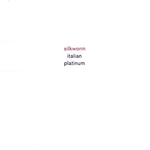 Silkworm
SilkwormItalian Platinum (Touch and Go) As Silkworm becomes more and more a studio creation and less a traveling outfit, I seem to find a greater affinity with the band's output. In this version of events, Matt Kadane of Bedhead and the New Year fame has been installed as keyboard player, and Kelly Hogan stops by to nail a few vocals. The trio of Andy Cohen, Tim Midgett and Michael Dahlquist is still at the core of things. In particular, Cohen and Midgett have developed songwriting styles that really work well. I thought early Silkworm was a bit high on concept and low and execution. There are still some noodly moments here, but for the most part these songs sound great from start to finish. In particular, the addition of Kadane and the contributions of Hogan really add some spice to Silkworm's usual chunky rock paradigms. The pieces are just so much more coherent than what I heard from this band some 10 years ago. But you can forget all those words of derision (I really wasn't very nice, as I recall). Maybe the music has gotten better (strike that "maybe" and insert "certainly"), but I think as much as anything my tastes have broadened and expanded just as Silkworm's range and skill has. Thinking man's rock never sounded so good.
Solution Science Systems Solution Science Systems EP (self-released) Featuring Rob MacGrogan and Andy Tegethoff of the Taybacks (with Kelly Shane kicking in on drums), Solution Science Systems sounds nothing like anything, precisely. There are Yes-like chord progressions, strange little skits that remind me of Devo (though I don't think Devo ever really did that kinda stuff) and the occasional backbeat. Just for the hell of it, I guess. A strange, fluffy sort of concoction, one that works only because these three guys are having way too much fun acting like loony prog gods. If this was a serious project (in that sort of "artiste" way), well, it would be annoying if not downright grating. But fun is on the agenda, and that's what I had. Can I take this seriously? Do I want to? Of course not. I'll just let the candy floss drift in the breeze and catch in my hair. Just like I was 11 all over again.
������������������������������������� 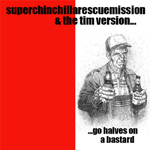 Super Chinchilla Rescue Mission/The Tim Version
Super Chinchilla Rescue Mission/The Tim VersionGo Halves on a Bastard split EP (Attention Deficit Disorder) Super Chinchilla Rescue Mission (which deserves accolades just for its name) hails from D.C. (the metro area, at least) and the Tim Version is once from Tampa. Both are melodic punk bands that don't let solid tunesmithing get in the way of making glorious ragged noise. SCRM is vaguely more raucous, but also more melodic. The Tim Version strikes me as almost emo from time to time (musically, not in terms of the themes, which are much more punk kinda punk). Both know how to pen fine songs and kick them out with style. And with song titles like "Drink Till the Mirror Loves You" (SCRM) and "I left My Nuts in San Francisco" (TV), well, it's easy to see that these boys have a fun sense of humor. Indeed, this entire outing bristles with energetic joy.
�������������������������������������  Tiltwheel/Watch It Burn
Tiltwheel/Watch It BurnTwice the Dose split EP (Attention Deficit Disorder) Watch It Burn cranks out some solid emo tracks, and Tiltwheel bashes forth some basic pop punk songs. A bit of a contrast, one that makes for a most enjoyable disc. My little attempt at labeling kinda glosses over the fact that Watch It Burn likes melody a lot. For that matter, Tiltwheel has the strident guitars (a la a Naked Raygun) that a lot of emo bands use. Right. What I really need to mention is that there six great punk songs on this EP. If you've never heard of either of these bands, this release will get you to picking through the back bins looking for old albums. Truly.
�������������������������������������  Volumizer
VolumizerGaga for Gigi (Mint) Volumizer is made up of a few geezer types (Rodney Graham was the guitarist for U-J3RK5, whose only EP came out in 1980; Bill Napier-Hemy was guitarist for the Pointed Sticks, the first Canadian band to sign with Stiff; songwriter Jade Blade was a member of Dishrags), most of whom are artists in the visual sense in addition to their obvious musical talents. This is basic tuneful punk with plenty of Vancouver bass (there really is such a thing, you know) and a straightforward approach to playing. There are no tricks or hidden surprises. When the first chords of the riff blisters forth, the song has been defined. I don't have a problem with that, particularly when the pieces are as tight and sweet as these. Many times, simpler is better. Volumizer's members learned that lesson a long (long) time ago and put it to good use here. Play it loud and play it often. There's no need to apologize for basic rock and roll. There's just the need to let it overtake your soul.
������������������������������
Dale Collins Vivir en America cassette (self-released)
The Fucking Champs V (Drag City)
Philip Gayle with Richard Cholakian Hud Pes 2xCD (Yabyum Productions)
Tram A Kind of Closure (Jetset) ������������������������������������� |
|
return to A&A home page